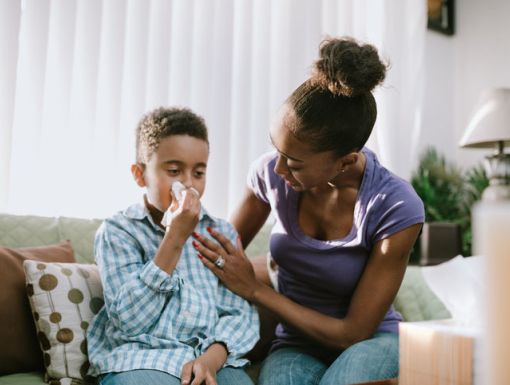
Symptoms of a Cold
The common cold is typically harmless and is a viral infection of your nose and throat. Many types of viruses can cause a cold. If someone with a virus touches a shopping cart at the grocery store, people who touch that same cart for several days afterward may pick up the virus. You could then contract the virus by touching your eyes, nose or mouth. Symptoms usually appear in one to three days after exposure to the virus.
Colds may occur any time of the year but are more common in the fall and winter months. Healthy adults can expect to have a cold two or three times a year. Young children and infants may have them more frequently, especially if they are in a daycare setting. Most people recover within 10 days. If you smoke, symptoms may last longer. Generally, you don’t need medical attention for a common cold, but if symptoms worsen, see you your doctor.
Symptoms
- Runny or stuffy nose
- Congestion
- Postnasal drip or drainage in the back of your throat
- Loss of taste or smell
- Chills
- Cough
- Congestion
- Body aches
- Sneezing
- Low-grade fever
- Fatigue
Discharge from your nose may become thicker and change in color as the cold runs its course.
Remedies
There are many treatments and remedies to relieve the symptoms of a cold. The most common over-the-counter medicines used for colds include decongestants, antihistamines and pain relievers. Be sure to read the label before taking any medications. The Food and Drug Administration doesn’t recommend children under the age of 4 take over-the-counter cold medicines.
The most effective home remedies for colds include gargling saltwater, resting and staying hydrated. A warm bath may also help to reduce a fever and ease the aches of experiencing a cold.
We recommend the following foods to help relieve some pain:
- Chicken noodle soup - It’s a classic when you’re sick! The salt from the soup will help ease your irritated throat tissue while the warm broth will help open your sinuses to make breathing easier.
- Yogurt - It contains millions of healthy bacteria that can boost your gut health. A healthy gut makes it difficult for viruses to take hold. You need more “good bacteria” to help fight minor illnesses like colds.
- Popsicles and hot tea - Popsicles and hot teas are great for colds and will help soothe sore throats. If you like warm drinks like tea, we recommend adding in honey for reducing coughs and slices of ginger to reduce inflammation and congestion.
Prevention
Colds are inconvenient and miserable. Although a vaccine to prevent colds isn’t an option, there a few things you can do this season to prevent you from picking up one of the viruses.
- Wash your hands. Keeping hands clean is one of the most important steps we can take to avoid getting sick. Be sure to wash your hands with soap and water for at least 15 seconds, or as long as it takes to sing “Happy Birthday.”.
- Disinfect your things. Using antibacterial cleaner in key spots such as tabletops, counter tops, remote controls, keyboards, doorknobs, light switches, faucet handles and toilet handles help kill viruses that can live on hard surfaces. Wash children’s toys periodically.
- Avoid others that may be sick. Germs are easily shared in confined spaces. If you notice someone isn’t feeling well, try to avoid them. If you come into contact with them, wash your hands directly after.
When to see a doctor
Although you generally don’t need to seek medical attention for a common cold, please seek medical attention if you have:
Adults
- Symptoms that worsen or fail to improve
- Fever greater than 101.3 F (38.5 C) lasting more than three days
- Fever returning after a fever-free period
- Shortness of breath
- Wheezing
- Severe sore throat, headache or sinus pain
Children
- Fever of 100.4 F (38 C) in newborns up to 12 weeks
- Rising fever or fever lasting more than two days in a child of any age
- Severe symptoms, such as headache, throat pain or cough
- Difficulty breathing or wheezing
- Ear pain
- Extreme fussiness
- Unusual dowsiness
- Lack of appetite
Visit one of our Primary Care locations today for relief of cold symptoms.



